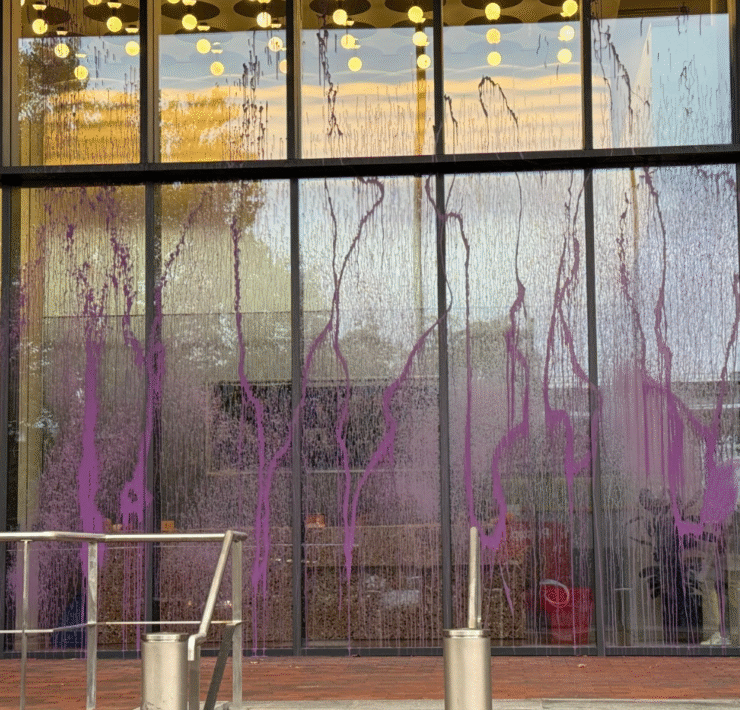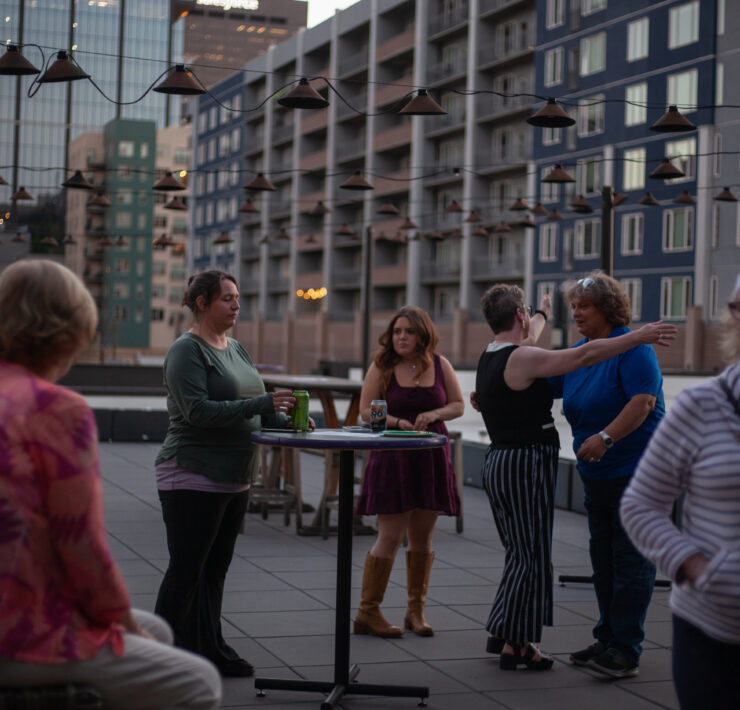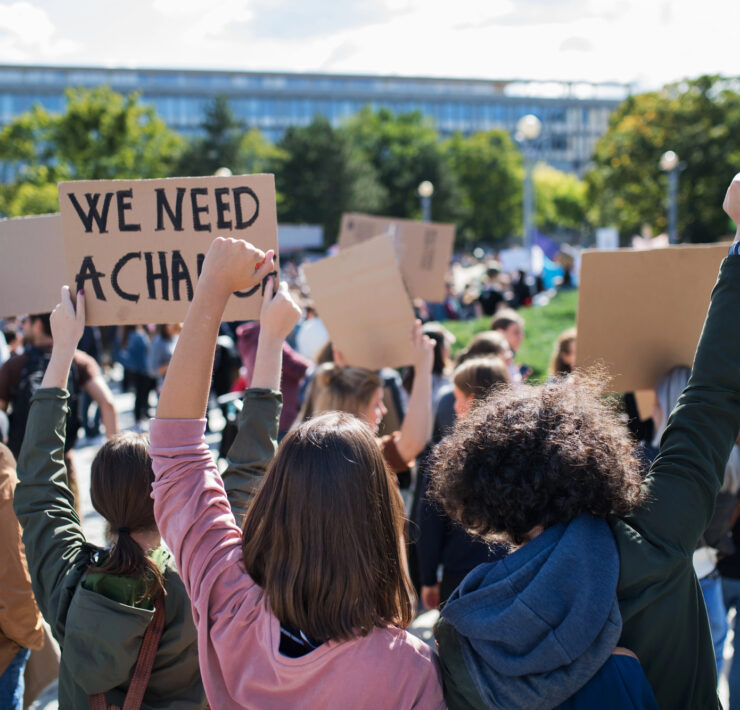HELLO HOMO: Pride and Protest Part One with Z Williams

Hello Homo,
What information do you have about the protest that took place at Pride on Saturday? I only caught the latter part of it. I was intrigued by some of the points made by the speaker and am curious about the conflict with the Center on Colfax. I would like to know more.
– Jill, Denver
Hello Jill!
Thank you for this question. I bet many people who attended Pride have similar questions about what took place and the motivations for the protest. Protests provide an opportunity for community conversations to be heard, which can be very confusing or activate complicated emotions. That’s kind of the point: to raise awareness about bigger social issues that can easily go unacknowledged and, hopefully, to open much-needed dialogue.
This question is going to be answered in two HELLO HOMO’s. One, today, with Z (they/them/theirs), the co-founder and co-director of Bread and Roses, a legal group that exists to disrupt the harms that the legal system causes people and their communities. Bread and Roses was one of the organizers of the protest.
The next HELLO HOMO will be with the new CEO of the Center on Colfax, Kim Salvaggio (she/her/hers).
My goal here is to role model a dialogue exemplifying how to have a challenging conversation without polarizing into good versus bad, right or wrong, or us versus them within the Denver LGBTQ+ community. We need more conversations like this.
So Z, how would you like to start answering this question from Jill?

Yeah, I mean, I’ve been protesting at Denver Pride since I was 16 years old. I am 39 years old now. Denver Pride has consistently chosen to prioritize partnerships with corporations and police, and has weaponized police and corporations against our community.
This year was a continuation of something that’s been going on since at least 2000. There is a long history of protesting Pride, which are community-led disruptions/contributions to Pride. A group of people came together this year, asking the Center on Colfax to do a few things.

Apartheid-Free Zone
Our number-one ask is to make Pride an apartheid-free zone. The center on Colfax is partnering with several businesses that have very deep relationships with the genocide happening in Palestine. We have asked nicely. We’ve had sit-ins; we’ve had petitions. We’ve tried all kinds of different ways to get them to commit to this. Pride should not be connected to genocide in any way.
Trans Protection
We also wanted to make sure that we’re lifting up the fact that trans people, especially trans women, are dying in Colorado. Jax Gratton was found a month ago. Jax was not found or brought home by corporations, not even from policing. It was community pressure and community persistence that her life meant something, and she deserved to be treated with decency. She deserves justice.
No Cops at Pride
We continue our demand that the Center divest from its relationship with law enforcement and invest in true community safety. The Center on Colfax has called the police on protests. Last year, we had live rounds pointed at us while we were on stage. We’ve had many threats from law enforcement. We’ve seen over the years that queer and trans people were severely injured by law enforcement at Pride, and we believe that the relationship between law enforcement is fundamentally incompatible with the history of Pride.
It is an ongoing conflict of interest since the initiation of LGBTQ+ liberation. The Stonewall Rebellion and the Black Cat Uprising we both responses to police violence toward LGBTQ+ people. The birth of the movement was against the police.

Recap on the asks
Here is an outline graphic, and the most important points are:
1) Divest from genocide
2) Prioritize trans safety
3) Divest from cops
4) Reinvest in our community
For OFM readers, who are not familiar with this conversation, what would you like them to know about the main mission and focus of protests like this?
We need to remember that pride is a protest. Pride is not a festival; it is not a $15 Coors Light. It is not a clacker fan or a lanyard from a corporation. Fascism is taking over our country. Corporations are gaining more and more power, while our working people are struggling to just survive. There’s a genocide being carried out in our name, and at this time I can’t imagine thinking that a corporate cop supported Pride Fest is what our people need.
Especially as a trans person, we are under attack. We need to be uniting and fighting.
We don’t need to be sitting in the shade, drinking an expensive beer, and watching drag performers. Now is the time to fight. What inspires me so deeply is the fight that was led by Black and Latinx sex workers who were teenagers in New York City in the height of the AIDS crisis and raging police violence. As they said then, We deserve better.
As we are speaking right now, (July 2) it is Sylvia Rivera’s birthday. Speaking of a disruptor.
We need to remember, in 1973, she was booed off the stage at Pride because she was saying things very similar to what we’re saying now.
With that bigger historical picture in mind, I noticed after the protest left the stage, representatives from the Pride Festival responded to the protest with concepts of coming together, uniting, and joining efforts to contribute to the same fight. Here you are also using similar language around coming together. Yet, there is a division while at the same time a parallel.
So people in power often ask for an end to division. What they usually mean is that they want people to stop protesting them. If the Center on Colfax wants to not be divisive they need to stop pretending that there aren’t queer and trans people in Palestine. That queer and trans people aren’t being murdered by police and brutalized by police regularly. That the corporations they actively partner with are not destroying our planet. Their call for a lack of division is actually a call for submission.
In response, is there any specific way that you would like readers to hold that tension between these differences?
What would Marsh P. Johnson do?
I think, again, when we think about Pride and when we think about who has changed our history, ask yourself, where would those people be at seen Pride Fest? Where would Les Feinberg or Marsha P. Johnson have been? Where would Miss Major be if we were blessed with her presence this June? I can tell you it would not be in the Coors VIP section.
What would you like the Center on Colfax to respond to?
You know, the Center’s at a really interesting transition point. I’m meeting with them tomorrow morning. We have a meeting with Kim, the new CEO
Kim has agreed to meet with me for a response interview to this interview as well. I was impressed with how receptive she was to the protest at Pride and listening to y’all. She seems very interested in forming a dialogue in the community about this.
Yeah, I will say that I am more optimistic than I’ve been in many years about the Center on Colfax since she took over, in terms of her openness to communication. By contrast, all of the Center employees basically had to force the previous CEO to come back from vacation to retract his anti-protest statement last year, and then to meet with us. So the invitation to the Center is big.
Truth and Reconciliation
I think about truth and reconciliation as a really powerful format acknowledging generational harm. Not just about how they follow our demands. Of course, we want that. Also, there’s harm, I mean, again, I’m 39 years old, and the Center has called the police on me since I was 16. And so, I know that other people, far more marginalized than I, feel other kinds of pain from them. So I hope from my invitation, there is truth and reconciliation from the Center.
To reflect what you are saying, we all do harm, most of the time unconsciously. It sounds like you are saying you would like the Center to take responsibility for the harm done to community member in their efforts to cultivate community and this festival.
We all cause harm. We all cause harm.
It’s not about if we cause harm or not, it’s about what we do to heal that harm. If there is reconciliation and collaboration moving forward, in an ideal situation, what would the Pride Festival look like to you?
Shifting to a Community-Driven Pride
To me, it’s having a community-driven Pride. Let’s have our march. We don’t need to ask the police to do it. I do un-permitted street marches, like, once a week. It’s easy, especially when you have that many people. We have resources in our community to make those things safe. Let’s lean into what we have in our community. Let’s have a community-driven parade.
Let’s have a festival that reflects what the community wants. What do we want to see in the world? What are the kinds of connections we want to make? It seems like when I go to the current festival, I see people getting way too hot, not being able to afford or access the things that they need to be healthy, and being pushed to buy a lot of booze. There is a lot of violence and consent issues amongst Pride-goers.
What would a Pride festival mean if people had access to resources that are important in creating uplifting spaces? Like showcasing local people making and doing things in the community, and giving them a chance to sell their art or promote their business without having to pay for a booth?
We are all human
So Z, how about for our readers who went to Pride to have a blast with their friends, maybe get sloppy and see some of their favorite drag queens, and then boom, they saw you take the stage and felt shame or guilt for wanting a fun Pride?
I mean, shame, blame, and stigma are enemies of our community in all forms. So if you see something today, and you’re like, Oh, man, maybe I should have done something different, then tomorrow is the gift to you to do that thing. Sitting in self-blame or shame, or doubt, or whatever, that always is going to fail you. That’s what heteronormativity has done to queerness for forever.
I want to make sure that this conversation with readers is framed within considerations of constant dialogue, because it is easy for a reader to feel polarized about what you are saying. My goal is to help readers see themselves in this conversation and to hold multiple perspectives.
So I say, take a queer approach, and remember there’s no binaries of a good person or a bad person, and that you can decide to fight any day of the week. Our movement is so excited to see people when they’re ready to show up.
How could people get involved to feel like they are called in a similar way?

People can always follow us on Bread and Roses Legal Center. We have a lot of different things that come up, a lot of different kinds of actions and activities that range from mutual aid, opportunities for political action, to engaging with legislation.
Thank you, Z for taking the time to answer Jill’s question and engaging in this dialogue. I am looking forward to sharing your words with the CEO of the Center On Colfax, Kim Salvaggio and carrying this conversation on in the next HELLO HOMO. Check out part two here.
Follow Bread and Roses on Instagram at @breadandroseslaw
Follow me on Instagram @holistic.homosexual for updates on my column, and stay tuned for the next HELLO HOMO! See you next week!
Have a question you would like answered? Submit your questions directly to me at hellohomo@ofm.media
Disclaimer: Hello Homo is for informational and educational purposes and is not a substitute for mental health treatment. Hello, Homo (Jesse Proia) is not providing mental health advice, diagnosis, or treatment to readers. If you or someone you know is experiencing a mental health crisis or emergency, please contact 911, 988 or go to the nearest emergency room.
Images/photos courtesy of Bread and Roses










